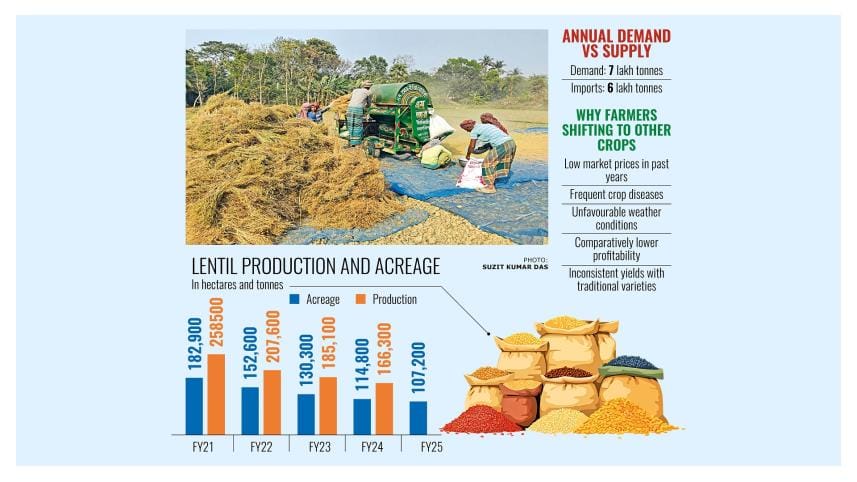Lentil acreage falls as farmers shift to more profitable crops

Both the acreage and production of lentils have been declining over the years, according to official data, as farmers cite a combination of factors, including lower profitability, frequent crop diseases and unfavourable weather.
Over the past five years, lentil cultivation has fallen by 75,700 hectares across the country, according to the Department of Agricultural Extension (DAE). Meanwhile, production dropped to 166,300 tonnes in fiscal year 2023-24, down from 258,500 tonnes in FY 2020-21.
The country's demand for lentils is around 700,000 tonnes a year, while 600,000 tonnes are imported.
At least 15 lentil farmers from different districts said they have been shifting away from lentil cultivation due to frequent crop diseases, unfavourable weather conditions and low profit grains compared to other crops.
As a result, lands once dedicated to lentil farming are now being used for more profitable crops such as onions, maize, wheat and bananas.
Naba Kumar Kundu, a lentil grower from Routara village in Magura Sadar upazila, said he used to cultivate lentils on six bighas of land, but this year, he has reduced it to four bighas due to declining yields caused by disease.
Instead, he has started cultivating maize, which brings him better earnings.
Md Abdur Rajjak, a lentil farmer from Darpa Narayanpur village in Rajbari Sadar upazila, said he cultivated lentils on 135 decimals of land this year, down from 180 decimals.
However, he recorded his highest yield in five years, harvesting 24 maunds of lentils. Prices this year range between Tk 3,400-3,600 per maund, compared to Tk 2,400-2,800 last year.
Abdus Sattar, a farmer from Gobordanga village in Kaliganj upazila of Jhenidah, said, "Although farmers have harvested good yields and are getting higher prices this year, the decline in acreage would not have happened if they had received good prices and yields in previous years."
Jahid Sheikh, a lentil farmer from Basunarasinhodia village in Faridpur Sadar upazila, said they usually grow BARI-2, BARI-3, BARI-4, and local varieties, but poor yields in previous years discouraged farmers.
This year, he cultivated BARI-8 on two bighas of land and saw an improved yield.
Natun Bazar in Magura is one of the biggest lentil markets in Bangladesh.
Md Abdus Salam, a lentil trader and president of Magura Natun Bazar Traders' Association, said that traders and millers from across the country used to buy and sell between 5,000-20,000 maunds of lentils daily, but now sales have dropped to 1,500-12,000 maunds.
Nipu Sikder, who owns a pulses processing mill in Kanaipur, Faridpur Sadar upazila, said small mill owners are struggling due to declining domestic lentil production.
"We used to buy lentils directly from farmers and process them into pulses for sale. But now, the government has to import lentils to meet demand, forcing small mill owners like us to shut down," he said.
Md Shahadujjaman, deputy director of the DAE in Faridpur, said lentil cultivation has declined in the past five years due to low prices and disease outbreaks.
"To meet demand, the government has to import lentils. However, better weather and improved BARI-8 seeds have led to good yields this year, and farmers are also getting better prices."
Shahadujjaman said if this trend continues, they hope to see an increase in lentil cultivation next year.



 For all latest news, follow The Daily Star's Google News channel.
For all latest news, follow The Daily Star's Google News channel.
Comments